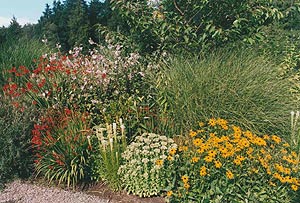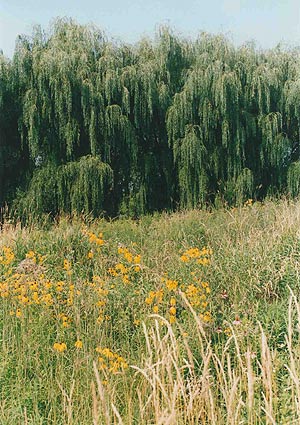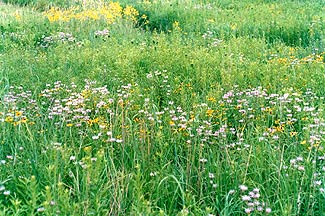RENEGADE GARDENER™
The lone voice of horticultural reason
Why Gardeners Are So Hip And Happy
5-2-04– I turn the page on my calendar and it is May. Those of us who garden across the north have returned to our gardens, our cherished, rightful places. We reacquaint ourselves slowly, as if meeting an old college roommate after many years’ absence. With furtive glances and tentative steps we pry and poke, curious about what has survived winter’s harsh entombment, while prepared (not always) for the discovery of what has not. Above all, we experience a marked lightening of spirit and brightening of disposition, as we slip slowly into the familiar practice of encouraging beauty and nurturing life.
What, that last sentence sounds a bit, well, flowery, you say? On the contrary, what gardeners have deduced intuitively for years – that gardening improves the mental health of the gardener – is now scientific fact.
 Solid research shows that the act of gardening, as well as the mere viewing of natural landscapes, positively impacts the physiological systems of the gardener or viewer, leading to a measurable improvement in mental health. As reported in the Wall Street Journal, and published in the June, 2003, issue of the Journal of Environmental Psychology, researchers at the University of California at Irvine have concluded that immersing oneself in nature is quantifiably good for one’s health.
Solid research shows that the act of gardening, as well as the mere viewing of natural landscapes, positively impacts the physiological systems of the gardener or viewer, leading to a measurable improvement in mental health. As reported in the Wall Street Journal, and published in the June, 2003, issue of the Journal of Environmental Psychology, researchers at the University of California at Irvine have concluded that immersing oneself in nature is quantifiably good for one’s health.
In the study, researchers assigned 112 young adults a succession of stressful tasks that occupied them for the first half of their day. In the afternoon, half the test subjects were allowed to relax in a room with a pleasant view of a forest, then allowed a stroll through the adjacent nature preserve. The other half spent the same amount of cooling-down time in a windowless room, then allowed to walk through a medium-density urban development.
 You guessed it. The blood pressure of those given the nature break resumed normal levels noticeably quicker than their counterparts. In addition, the attitudes and outlooks discerned through psychological testing of the group given the “tree treatment” were classified as substantially more positive concerning their morning tribulations than were those of the second group.
You guessed it. The blood pressure of those given the nature break resumed normal levels noticeably quicker than their counterparts. In addition, the attitudes and outlooks discerned through psychological testing of the group given the “tree treatment” were classified as substantially more positive concerning their morning tribulations than were those of the second group.
Dr. Roger Ulrich is an environmental psychologist and professor at Texas A&M University and his recent work on this topic is having major repercussions across not just the behavioral sciences, but the medical sciences as well.
In one study, Dr. Ulrich’s research found that surgery patients in hospitals recovered more quickly if the view from their beds was that of a garden. His related work confirms the work of others: Viewing a garden or other naturalized, plant-filled setting quickly reduces one’s pulse rate and blood pressure, and increases types of brain activity that induce natural, mood-lifting chemicals. We feel better. And you thought the avid gardeners you know spend so much of their time puttering in their gardens because they are laid-back, unhurried, stress-free types. Turns out it’s the other way around. Creating a garden that you experience every day makes you a more relaxed, happier human being.
The beneficial aspects of gardens and gardening on those who have suffered heartache, hardship, and even severe trauma are being recognized by all manner of mental health specialists, spurring the rise of a new practice known as horticultural therapy. Practitioners point to the simple fact that gardening induces a sense of control. Plant seeds, plant a tree, plant a container of annuals, and as the plants grow they become your charges, over which you have control. In the process of recovering from psychological ills, enabling patients to find areas in which they feel in control is a proven antidote to stress and anxiety brought on by severe past events.
 Principles of horticultural therapy provide benefit to any person or group. Earlier studies along similar lines have found that in corporate office campuses, productivity increases (and the number of employee sick days are diminished) following landscape renovation projects where office window views comprising acres of green grass and unnecessary asphalt and concrete surfaces are nixed in favor of blooming, native prairie combined with shrubs and trees. If you’re a corporation-owning honcho reading this column, I want you to go pop for an ample number of picnic tables, then pay a good landscaper to install them inside gardens set at the ends of pathways leading from your building. Watch your employees flock to the tables to eat their lunches all spring, summer, and fall. They will return to work rejuvenated, inspired, happy. If I may speak your language for a moment, this type of investment will make you money.
Principles of horticultural therapy provide benefit to any person or group. Earlier studies along similar lines have found that in corporate office campuses, productivity increases (and the number of employee sick days are diminished) following landscape renovation projects where office window views comprising acres of green grass and unnecessary asphalt and concrete surfaces are nixed in favor of blooming, native prairie combined with shrubs and trees. If you’re a corporation-owning honcho reading this column, I want you to go pop for an ample number of picnic tables, then pay a good landscaper to install them inside gardens set at the ends of pathways leading from your building. Watch your employees flock to the tables to eat their lunches all spring, summer, and fall. They will return to work rejuvenated, inspired, happy. If I may speak your language for a moment, this type of investment will make you money.
Humans are better people when they have daily doses of the magic contained in plants. Might this not be a good spring in which to start a garden?
Don Engebretson
The Renegade Gardener